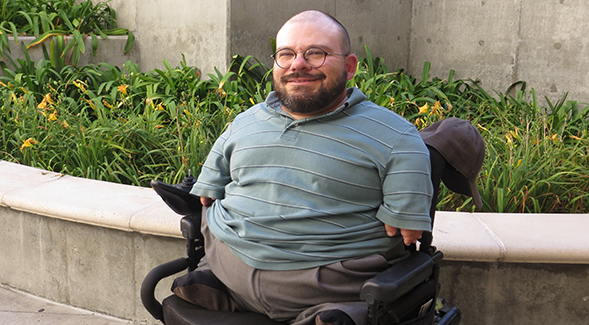In the National Conversation about Bioethics and COVID-19
SDSU philosophy professor Joseph Stramondo speaks on the intersection of biology and ethics within the COVID-19 pandemic.

A major conversation during the coronavirus (COVID-19) pandemic relates to bioethics — the study of biology and ethics — evaluating the criteria applied to maximize the benefits of scarce medical resources.
Among the issues: how can we distribute resources such as ICU hospital beds and personal protective equipment, if there is not enough for everyone who needs such equipment?
“I think much of this conversation was prompted by watching what happened in Italy when doctors and hospitals had to use disaster triage protocol to choose who receives life saving resources, like ventilators,” said Joe Stramondo, an assistant professor of philosophy and associate director of the Institute for Ethics and Public Affairs at San Diego State University.
“In a way, it’s not that all of these issues are suddenly more important, it’s that they are suddenly more dramatized,” Stramondo said. “That is, this is an opportunity to bring people’s awareness to these problems that disability advocates have been grappling with for decades.”
SDSU NewsCenter asked Stramondo, who has produced a series of posts on the topic for the bioethics.net blog, about his research and managing the ongoing COVID-19 pandemic.
How has your research prepared you to answer the many ethical questions that have come to the forefront as related to access to treatment (ventilators and other lifesaving-resources) during the COVID-19 pandemic?
My research focuses on how bias against disabled people pervades the field of bioethics, which often props up systemic ableist oppression. This bias has become quite explicit in some of the protocols for rationing resources proposed during the pandemic. For instance, some of these protocols have categorically denied treatment to anyone with an intellectual disability, even though one’s cognitive function has no impact on their likelihood of surviving the disease with the use of a ventilator.
This kind of rationing criteria is based on a certain view about what kind of existence gives a human being access to enough well-being that it’s worth using scarce resources to maintain that existence. Thinking about the relationship between disability and well-being has been a central focus of my career, and I can now apply this thinking to the rationing problems we may now face.
Describe how your research and work tied to disability advocacy, fairness, and equity as related to health issues have helped bring awareness of needed change to the forefront.
All of the possible rationing criteria are going to involve trade-offs. For instance, it might seem like it makes sense to deprioritize people who need more time on ventilators to recover, so that we maximize the number of lives that can be saved. Yet, this will unfairly disadvantage people with medical conditions that complicate the recovery process which are themselves the result of systemic oppression (i.e. diabetes is more common in poorer communities or communities of people of color because of the social determinants of health).
Instead, maybe we might use a first-come, first served system that doesn’t use any kind of rationing protocol at all. In this case, we would be disadvantaging disabled people who have a harder time physically getting to the hospital. I have been part of a very broad effort in bioethics to point out these flaws in rationing schemes. Even if all triage protocols are morally problematic, it’s important to bring to the foreground all of the ways in which they have the potential to do harm, so that fully informed decisions can be made about what to do.
What are key takeaways for those that read your blog articles and white paper, or listen to the podcast?
There needs to be a broad conversation about who we value in our society and why. These rationing protocols and policy failures lay bare systemic biases that existed prior to the pandemic and will continue afterward if we don’t build the political will to change them. It’s not just about who gets a ventilator, but how we organize society in many ways that don’t show equal respect for the lives and flourishing of marginalized people.
Bioethics is having a moment in the social sphere. How does it make you feel?
In a way, it’s been a bit overwhelming.
Transitioning to a virtual format with my teaching mid-semester, having both of my young kids at home because of daycare closing, and just the general anxiety of the pandemic have made it difficult to balance the responsibility I feel to speak up publicly about these issues. Lives are at stake and this is a real opportunity to start a broad conversation about ableism in medical practice that I hope extends past this point in history.
How will changes today affect the future of health policy?
I am hoping we will continue to critique the conditions that have led to COVID-19 having a disparate impact on people receiving long-term care in nursing homes, psychiatric facilities, prisons, group homes, and other institutional settings. These arrangements exist to maximize efficiency and profits for corporations that run these places, not to create lives of flourishing for the people that reside in them. Stramondo has also participated in a podcast from the American Medical Association's Journal of Ethics, webinar panel discussions at Harvard and University of Washington, and also co-authored a white paper.
Read Joe Stramondo’s blogs online:



